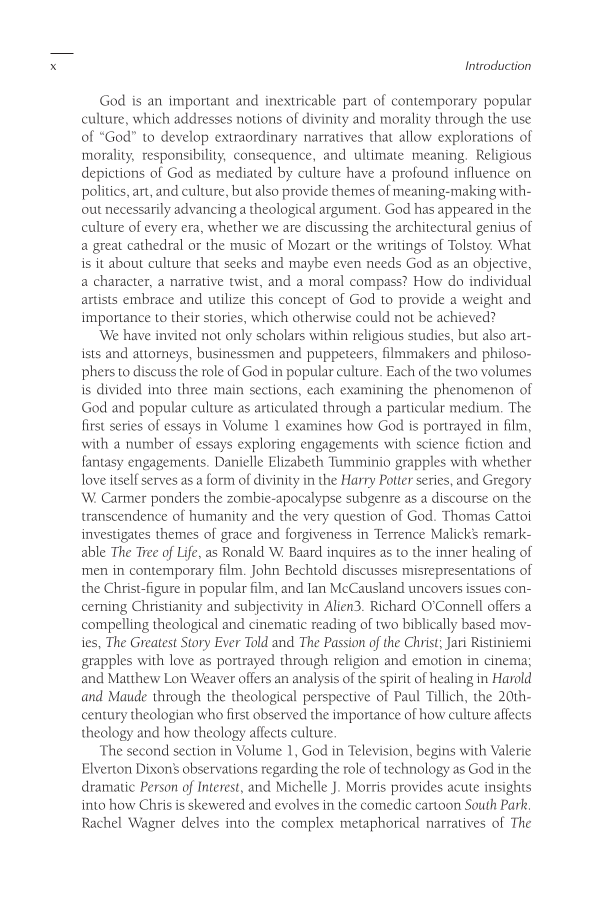x Introduction God is an important and inextricable part of contemporary popular culture, which addresses notions of divinity and morality through the use of “God” to develop extraordinary narratives that allow explorations of morality, responsibility, consequence, and ultimate meaning. Religious depictions of God as mediated by culture have a profound influence on politics, art, and culture, but also provide themes of meaning-making with- out necessarily advancing a theological argument. God has appeared in the culture of every era, whether we are discussing the architectural genius of a great cathedral or the music of Mozart or the writings of Tolstoy. What is it about culture that seeks and maybe even needs God as an objective, a character, a narrative twist, and a moral compass? How do individual artists embrace and utilize this concept of God to provide a weight and importance to their stories, which otherwise could not be achieved? We have invited not only scholars within religious studies, but also art- ists and attorneys, businessmen and puppeteers, filmmakers and philoso- phers to discuss the role of God in popular culture. Each of the two volumes is divided into three main sections, each examining the phenomenon of God and popular culture as articulated through a particular medium. The first series of essays in Volume 1 examines how God is portrayed in film, with a number of essays exploring engagements with science fiction and fantasy engagements. Danielle Elizabeth Tumminio grapples with whether love itself serves as a form of divinity in the Harry Potter series, and Gregory W. Carmer ponders the zombie-apocalypse subgenre as a discourse on the transcendence of humanity and the very question of God. Thomas Cattoi investigates themes of grace and forgiveness in Terrence Malick’s remark- able The Tree of Life, as Ronald W. Baard inquires as to the inner healing of men in contemporary film. John Bechtold discusses misrepresentations of the Christ-figure in popular film, and Ian McCausland uncovers issues con- cerning Christianity and subjectivity in Alien3. Richard O’Connell offers a compelling theological and cinematic reading of two biblically based mov- ies, The Greatest Story Ever Told and The Passion of the Christ Jari Ristiniemi grapples with love as portrayed through religion and emotion in cinema and Matthew Lon Weaver offers an analysis of the spirit of healing in Harold and Maude through the theological perspective of Paul Tillich, the 20th- century theologian who first observed the importance of how culture affects theology and how theology affects culture. The second section in Volume 1, God in Television, begins with Valerie Elverton Dixon’s observations regarding the role of technology as God in the dramatic Person of Interest, and Michelle J. Morris provides acute insights into how Chris is skewered and evolves in the comedic cartoon South Park. Rachel Wagner delves into the complex metaphorical narratives of The
Document Details My Account Print multiple pages
Print
You have printed 0 times in the last 24 hours.
Your print count will reset on at .
You may print 0 more time(s) before then.
You may print a maximum of 0 pages at a time.











































































































































































































































































































































































































































































































































































































































































